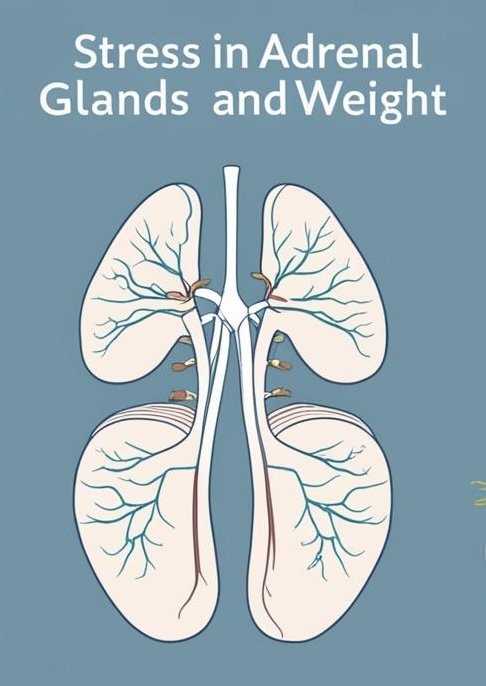How Stress is Really Affecting You: Understanding the Role of Adrenals and Cortisol in Weight Gain and Metabolism
In today’s fast-paced world, stress is more than a passing feeling—it’s a physiological event that can profoundly affect your weight, metabolism, and overall health. From work deadlines to personal responsibilities, stress has become a constant companion for many, often leading to elevated cortisol levels and a host of health challenges. The good news? Understanding stress and addressing it with practical strategies can help you take back control. Here’s a closer look at the science of stress, its effects, and practical, science-backed ways to manage it effectively.
The Science of Stress: How It Affects Your Body
When you encounter stress, your body triggers the “fight or flight” response, releasing stress hormones like adrenaline and cortisol. While this response is designed to protect you in short-term emergencies, chronic stress keeps cortisol levels elevated, leading to negative effects, including:
- Weight Gain: Chronic cortisol elevation drives hunger and cravings, particularly for sugary and high-fat foods. It also promotes fat storage in the abdominal region, which is linked to a higher risk of metabolic syndrome.
- Slowed Metabolism: Elevated cortisol can contribute to insulin resistance and disrupt digestion, reducing your body’s ability to efficiently process and store energy.
- Muscle Breakdown: Prolonged cortisol exposure can lead to muscle loss, slowing your metabolic rate and making it harder to maintain a healthy weight.
- Impaired Immune Function: Chronic stress suppresses the immune system, leaving you more vulnerable to illness.
Practical Ways to Address Stress
Managing stress effectively requires a holistic approach that combines lifestyle changes, mindfulness techniques, and targeted support for your adrenal and cortisol health.
1. Prioritize Quality Sleep
- Why It Helps: Sleep is essential for regulating cortisol levels. Poor sleep increases stress hormones, making it harder to recover.
- Action Steps:
- Stick to a consistent sleep schedule.
- Create a calming bedtime routine (e.g., dim lights, no screens 1–2 hours before bed).
- Ensure your bedroom is cool, dark, and quiet.
- Try magnesium glycinate or melatonin if needed (consult your healthcare provider).
2. Eat to Balance Blood Sugar
- Why It Helps: High-sugar and processed foods exacerbate cortisol spikes. Balanced meals can stabilize your energy levels and improve your body’s response to stress.
- Action Steps:
- Focus on whole, nutrient-dense foods like lean proteins, healthy fats, and low-glycemic carbs.
- Incorporate magnesium-rich foods (spinach, almonds, dark chocolate) and vitamin C (citrus fruits, bell peppers), which support adrenal health.
- Avoid skipping meals—regular eating patterns help keep cortisol levels in check.
3. Move Your Body (But Don’t Overdo It)
- Why It Helps: Exercise reduces cortisol levels and boosts endorphins, but overtraining can have the opposite effect.
- Action Steps:
- Aim for 30–60 minutes of moderate exercise most days, such as brisk walking, cycling, or yoga.
- Try stress-relieving activities like tai chi, pilates, or dancing.
- Avoid high-intensity workouts if you’re feeling overly stressed or fatigued.
4. Practice Mindfulness and Relaxation Techniques
- Why It Helps: Mindfulness-based practices directly lower cortisol and promote a sense of calm.
- Action Steps:
- Meditate daily, even if it’s just for 5–10 minutes.
- Try deep breathing exercises, such as box breathing (inhale for 4 seconds, hold for 4 seconds, exhale for 4 seconds).
- Journaling or gratitude practices can help reframe stressors in a positive light.
- Engage in hobbies that bring you joy and relaxation.
5. Herbal Supplements to Support Adrenal Health
In addition to lifestyle changes, certain adaptogenic herbs and natural supplements can help regulate cortisol and enhance your resilience to stress. Always consult a healthcare professional before starting new supplements.
- Ashwagandha: Known for its ability to lower cortisol and support adrenal balance, ashwagandha also promotes a sense of calm and improves energy.
- Rhodiola Rosea: Enhances mental clarity, stamina, and resilience to stress.
- Holy Basil: Reduces cortisol and promotes a calm, centered state of mind.
- Schisandra Berry: An adaptogen that supports energy, focus, and adrenal function.
- Licorice Root: Helps maintain cortisol balance but should be used cautiously, especially if you have high blood pressure.
- Maca Root: Balances hormones, combats fatigue, and boosts energy levels.
6. Manage Your Time and Set Boundaries
- Why It Helps: Feeling overwhelmed often stems from overcommitting or poor time management, which exacerbates stress.
- Action Steps:
- Use tools like planners or digital apps to organize tasks.
- Prioritize essential tasks and learn to delegate or say “no” to nonessential commitments.
- Set boundaries with work or personal relationships to protect your mental space.
7. Support Detoxification
- Why It Helps: Chronic stress increases the burden on your liver and detox pathways, especially during cortisol and adrenal recovery.
- Action Steps:
- Stay hydrated and include detox-supporting foods like leafy greens, cruciferous vegetables, and lemon water.
- Consider natural binders like activated charcoal or bentonite clay to help remove toxins.
- Incorporate liver-supporting supplements such as milk thistle or dandelion root.
Final Thoughts
Chronic stress is more than a mental state—it’s a physiological condition that impacts every part of your health, from weight to metabolism and energy levels. By understanding how stress affects your body and taking practical steps to address it, you can regain balance and improve your overall well-being.
Whether it’s incorporating mindfulness practices, eating for blood sugar stability, or exploring natural adaptogens, managing stress is a vital part of achieving optimal health. Remember, healing takes time, and everyone’s journey is unique. Consult a healthcare professional for personalized guidance, and know that each step you take brings you closer to a healthier, more balanced life.
